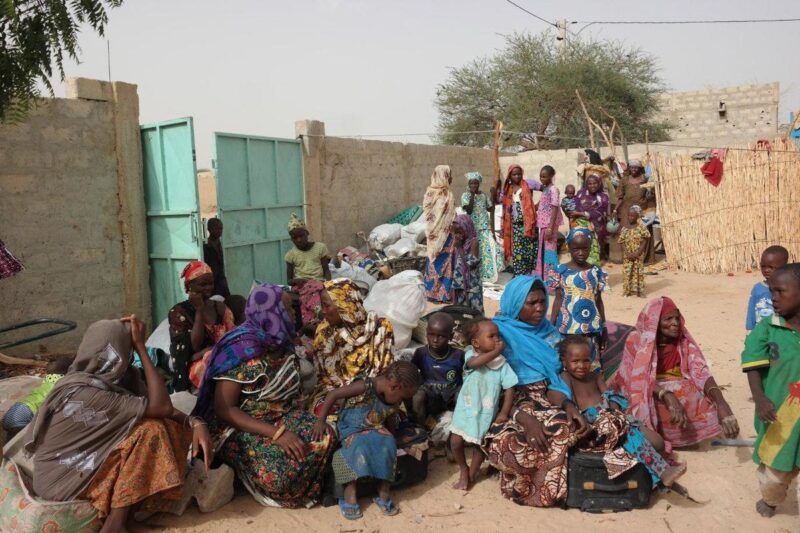Governor highlights the need for collaboration with the UNHCR to ensure thousands of Nigerian refugees in neighbouring countries are repatriated and resettled in a dignified manner.
Thousands of Nigerian refugees in Chad, Niger and Cameroon will be repatriated to their homeland in a dignified manner that respects their traditions and cultural values.
Borno State governor Babagana Umara Zulum reiterated this commitment during a meeting on Monday, August 12, with a delegation from the United Nations High Commissioner for Refugees (UNHCR).
At the meeting held in Maiduguri, the state capital, Zulum highlighted the need for collaboration with the UNHCR to ensure that refugees in neighbouring countries – as well as internally displaced persons (IDPs) still living in camps – are repatriated and resettled in a dignified manner so that they can rebuild their lives with the necessary support and infrastructure.
Raouf Mazou, the assistant high commissioner for operations, who led the UN delegation, emphasised the need for sustainable solutions amid ever-decreasing humanitarian resources.
He said global crises had resulted in the growing challenge of providing adequate support.
“We have been present for a very long period of time and, in the past 15 years, we’ve seen an increase in the number of people displaced inside the state and also in neighbouring countries.
“What we have seen here in Borno, in a number of locations, is that humanitarian assistance has continued for a long period of time.
“Because of all the crises occurring around the world, we have seen less and less mobilisation of humanitarian resources, which has had an impact on all populations.”
Mazou said the UN’s Office for the Coordination of Humanitarian Affairs (OCHA) had reported that only 16% of the required funding for global humanitarian responses had been secured by mid-2024.
This amounted to about US$7.9 billion out of an estimated US$48.7 billion needed to address the most urgent crises this year. The figure was 18% lower than the amount raised during the same period last year.
He said the UNHCR’s mandate was to support the Borno government by providing protection not only to refugees but also to internally displaced persons. But that had not been easy because of the crises that were occurring around the world.
Mazou said the UNHCR would support the Borno State government but said it was imperative for repatriated refugees and displaced persons to become self-reliant and independent, so that they did not have to rely so heavily on humanitarian aid and were able to move forward in a sustainable manner beyond the initial support.
Zulum said that short-term solutions were “no longer viable” and his administration had shifted its focus from providing humanitarian aid to implementing developmental initiatives.
The new approach, which he referred to as the “Humanitarian Peace-Development Nexus”, emphasised the importance of transitioning from temporary relief to sustainable development.
“We express our gratitude to UNHCR for facilitating the repatriation of individuals from Cameroon and anticipate similar actions for Chad and Niger. Our partnership with UNHCR remains strong, emphasising the dignified return of individuals to their communities.
“We have initiated an appeal for the repatriation of our people to their communities and we urge the UNHCR to align with our strategies.”
However, he said his administration had one request. “The government has to take ownership of any intervention. If there is anybody who does not want the state government to take ownership, then we want to maintain our dignity and convey a message to these organisations that we thank you very much but we do not need such interventions.
He said progress was being made. At the height of the conflict, as many as 3.2 million people in Borno State had been displaced. This number included people who fled to the neighbouring countries of Chad, Niger and Cameroon and those who fled to safer areas within the state.
In the past three years, his administration had successfully resettled 1.2 million individuals.
“Currently, one million displaced persons remain in camps,” he said.
“What we are doing is necessary. We aim to resettle them in their ancestral homes or locations of their choice in a dignified manner that will ensure they have access to services and are fully integrated into their communities.”
In an exclusive interview with RNI in May this year, Borno’s Commissioner for Local Government and Emirate Affairs, Sugun Mai Mele, who is also a member of the refugee repatriation committee, accused some humanitarian organisations of sabotaging the government’s efforts to return Nigerian refugees from neighboring countries. The organisations have consistently denied the allegation.
MAMMAN MAHMOOD









